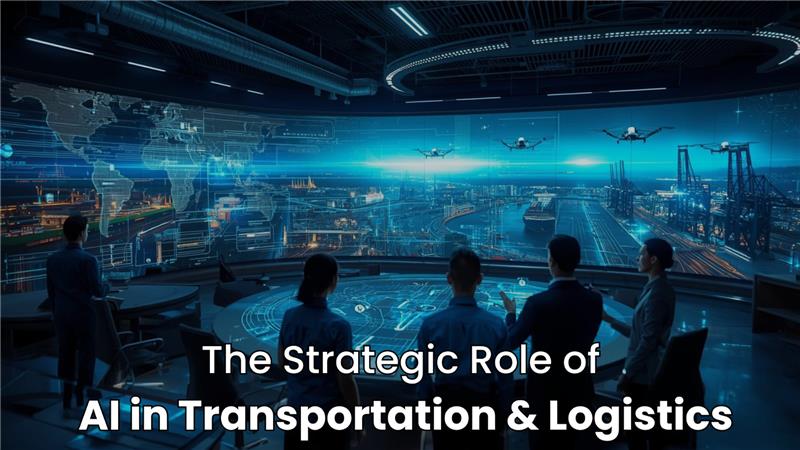Considering the growth narrative, there is no doubt that global markets are expanding, and trade has become international. UNCTAD shares about the same, reflecting a 2.5% rise in global trade
Considering the growth narrative, there is no doubt that global markets are expanding, and trade has become international. UNCTAD shares about the same, reflecting a 2.5% rise in global trade in the second quarter of 2025. Among all these changes, the transportation and logistics industry has experienced a remarkable shift. This is because they are leading this wheel of development. So, being at the forefront of this opportunity, what leaders truly count on is integrating AI into their business functions.
On this note, AI in transportation and logistics has brought many changes in the logistics industry that include demand forecasting and route optimization. Some innovations like autonomous fleets, predictive maintenance, and intelligent warehouse practices are widely adopted by companies today. For leaders, this strategic shift implies more customer-centric, cost-optimized systems and highly insightful decision-making.
This immersive article explores this dynamic shift that AI has brought in transportation and logistics, mainly focusing on its strategic role. We will also discuss how a logistics software development company can help move forward with AI in this space.
Role of AI in Transportation and Logistics
It is globally accepted that, led by data, automation, and intelligence, transportation and logistics have adapted in real time. In this view, let’s understand how AI has contributed to their value-driven processes.
With AI as the central theme, leaders have focused on boosting their enterprise's supply chain efficiency, visibility, and resilience. These results can be finely attributed to intelligent decision-making done by tools like predictive analytics. This ML-powered tech helps anticipate future orders based on past trends. It further helps companies optimize fleet planning (vehicles) and their associated cost sheet.
Additionally, AI-powered route optimization has practically helped vehicles and containers reach their destination on time, thereby minimizing process delays. Moreover, teams can track them and plan their workflows accordingly.
Focusing on quality deliverables, organizations have implemented computer vision and robotics to support their inspection processes and worker safety. What’s more, anomaly detection has also contributed to smoother workflows and reduced unplanned downtime.
Owing to these upgrades, warehouse management and transportation have been showing a better business ROI. As a result, leaders are keen to incorporate AI technologies to develop smarter and agile logistics. This can be done through hiring adept teams providing artificial intelligence development services that can help custom-develop these models/software for your organization.
That being said, AI can be a strategic lead technology partner for your firm operating in these industries.
Benefits of AI in Transportation & Logistics
For modern transportation company CEOs, AI-powered tools and technology are a booming opportunity. In essence, let us understand its benefits for companies in detail.
- Advanced Safety and Cybersecurity Measures
By leveraging IoT and sensors, companies can enable live tracking of their orders, shipments, and containers. What’s more, these also help teams identify issues that may affect equipment performance.
Thus, finding a solution can be more proactive and timely. At its core, it helps in safeguarding personnel from accidents, ensuring workforce safety. Additionally, these solutions are cyber-secure through encryption, authentication, and monitoring, preventing data manipulation tactics strongly. - Faster Emergency Response
Notably, transportation accidents, like truck collisions, maritime mishaps, and rail incidents, are quite common in this industry. Here, IoT and sensor detection and alert systems can help in saving both people and assets by detecting equipment failure.
These insights are usually followed by the protocol of teams responding to emergencies quickly, thereby reducing their huge and stressful impact. - AI-Powered Workflow Management
Beyond implementing safety protocols, AI and ML help analyze traffic, weather, and delivery patterns. This allows teams to manage routes and fleet efficiency as needed. As a result, the resources are more strategically allocated and operational costs are optimized. - Environmental Benefits: Reduced Carbon Emissions
There is no doubt that present-day leaders are more inclined towards following sustainable business practices. Hence, they focus on reducing carbon emissions. AI also supports this case by enabling optimal fuel usage and energy consumption across the enterprise supply chain networks. In a way, this helps them fulfill their environmental responsibility. - Competitive Market Pricing
AI systems developed by an expert logistics software development company can precisely evaluate future demand, capacity, and evolving market conditions to recommend optimal freight pricing. This allows leaders the advantage of offering quality goods at a competitive market price. - Promising Better UX
Finally, all these benefits help in assessing and meeting customer demands in a timely manner. And this predictability is what a customer counts on to trust a brand. As a result, it can translate into higher user satisfaction and loyalty.
Use Cases of AI in Transportation and Logistics
Notably, a considerate AI integration can reap numerous benefits for an enterprise. Now, let us explore some of its use instances to recognize the effect of AI in this enterprise.
- Predictive Maintenance
Modern tools can constantly monitor vehicle and equipment health in real-time by leveraging IoT devices and ML. This enables detecting signs of system failure, which helps set maintenance schedules. Ultimately, this helps extend the life of the assets. - Customer Service Chatbots
Interestingly, AI-powered chatbots are very useful. They help in providing shipment updates, responding to delivery queries, and gathering user feedback. Driven by NLP capabilities, their automated responses are faster and accurate. This helps improve the overall efficiency of the system. - Autonomous Vehicles
This segment has gained immense investment for research and development so far. Moreover, it shows remarkable potential for growth. This is reflected by a report by McKinsey that states that AI-powered unmanned vehicles may grow to become a $600 billion market by 2035.
That being said, self-driving trucks can handle long-haul commutes without human intervention. As a result, they help leaders overcome the issue of driver shortage and high transportation costs to a certain degree. - Smart Parking Solutions
This computer vision-led innovation, which can be developed by a logistics software development company, helps vehicles park based on space availability. Strategically, it makes parking simpler, while helping in better utilization of space and reducing idle time. It also allows vehicles to operate and unload smoothly in logistics.
Final Thoughts
AI is a great technology that has been redefining logistics operations and warehouse management. Leading them towards excellence, it can churn high volumes of data to deliver real-time vehicle tracking, personalized driver experiences, and inventory management.
Further, we recommend that you connect with providers offering expert artificial intelligence development services, as they can remodel your growth chart in the right direction. It is because they can help you build and work on custom AI models that will be a strategic driver for your expansion in this industry.
Respond to this article with emojis






